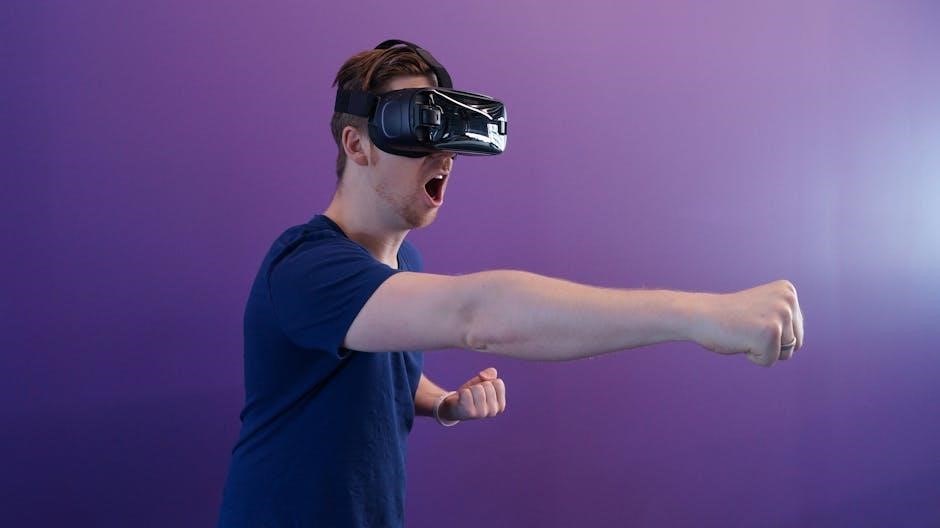Yuval Noah Harari’s 21 Lessons for the 21st Century offers a profound guide to navigating today’s complex world, blending insights on technology, politics, and human evolution. Harari, renowned for Sapiens and Homo Deus, challenges readers to rethink their understanding of power, identity, and morality in a rapidly changing global landscape. This book serves as a roadmap for fostering critical thinking and adaptability in the face of unprecedented challenges, making it essential for anyone seeking to thrive in the modern era.
Overview of the Book and Its Significance
21 Lessons for the 21st Century by Yuval Noah Harari is a thought-provoking exploration of the challenges and opportunities facing humanity today. The book is structured as a series of essays, each addressing a critical issue, from technological disruption to climate change. Harari’s unique ability to synthesize history, philosophy, and science makes the book accessible to a broad audience. A key theme is the need for global cooperation to tackle problems like fake news, artificial intelligence, and political polarization. Harari emphasizes the importance of education and lifelong learning in preparing for an uncertain future. The book has been widely praised for its clarity and relevance, offering readers a roadmap to navigate the complexities of the modern world. Its significance lies in its ability to inspire critical thinking and encourage individuals to take an active role in shaping the future. Harari’s work continues to influence global discussions on humanity’s path forward.
Author Yuval Noah Harari: Background and Influence
Yuval Noah Harari, an Israeli historian and philosopher, has become a global intellectual leader, renowned for his ability to simplify complex ideas. Born in 1976, Harari earned his Ph.D. in history from the University of Oxford. His earlier works, Sapiens: A Brief History of Humankind and Homo Deus: A Brief History of Tomorrow, became international bestsellers, establishing him as a leading voice on humanity’s past, present, and future. Harari’s unique perspective blends history, science, and philosophy, making his ideas accessible to a wide audience. He is known for his minimalist lifestyle, avoiding smartphones to conserve time and attention, and practices meditation to deepen his insights. Harari’s influence extends beyond academia, shaping public discourse on topics like technology, ethics, and global challenges. His work has been praised for its clarity and depth, solidifying his role as one of the most important thinkers of the 21st century.

The Core Challenges of the 21st Century
The 21st century faces critical challenges like technological disruption, political polarization, and climate change, all of which demand urgent attention and global cooperation to ensure humanity’s sustainable future.
Technological Disruption and Its Impact on Humanity
Technological disruption is reshaping human life at an unprecedented pace, bringing both immense opportunities and significant challenges. Advances in artificial intelligence, automation, and biotechnology are transforming industries, from healthcare to education, but also raising ethical dilemmas. The rise of hacking and cyberterrorism threatens global security, while the spread of fake news undermines trust in institutions. Yuval Noah Harari emphasizes the need for adaptability and ethical frameworks to navigate this digital revolution. As machines increasingly perform tasks once done by humans, societies must address issues like job displacement and privacy concerns. Harari argues that while technology can empower individuals, it also risks exacerbating inequality and eroding human agency. The challenge lies in harnessing innovation responsibly to ensure it serves humanity’s collective well-being rather than undermining it. This requires a global effort to establish norms and regulations that balance progress with ethical considerations.
The Rise of Political Polarization and Global Instability
Political polarization and global instability are among the most pressing challenges of the 21st century, as highlighted in Yuval Noah Harari’s work. The rise of divisive ideologies, fueled by social media and misinformation, has deepened societal fractures. Harari warns that such polarization undermines global cooperation, essential for addressing shared threats like climate change and technological disruption. The proliferation of fake news, as seen in recent geopolitical tensions, further erodes trust in institutions. For instance, the barbs exchanged between Israeli officials and Al Jazeera, as well as the propaganda videos released by Hamas, illustrate how information warfare exacerbates conflicts. Harari emphasizes the need for a unified global response to these challenges, urging leaders and individuals to transcend partisan divides. Without such efforts, the world risks descending into chaos, making it harder to tackle existential threats. The stakes are high, and the window for action is narrowing rapidly.
Climate Change and Environmental Sustainability
Climate change stands as one of the most critical challenges of the 21st century, threatening global stability and ecosystems. Yuval Noah Harari underscores the urgency of addressing environmental sustainability, as human activities continue to degrade the planet. The recent fires in Israel, described as potentially the largest in its history, highlight the devastating impact of climate-related disasters. Harari emphasizes the need for global cooperation to combat this existential threat, as no nation can isolate itself from the consequences of environmental degradation. The intersection of technological advancement and sustainability is also a key focus, with Harari advocating for ethical innovation to balance progress with planetary health. Without immediate action, the world risks irreversible damage, making climate change a defining issue of our time that demands collective responsibility and radical solutions. The stakes are high, and the window for meaningful change is rapidly closing.
The Role of Nations and Religions in the Modern World
Nations maintain influence through military and cultural power, while religions adapt to modern challenges, blending tradition with contemporary issues like technology and global connectivity.
Are Nations Still Relevant in a Globalized World?
Nations remain pivotal in shaping global dynamics, despite increasing interconnectedness. They wield significant influence through military power, economic policies, and cultural identity. However, globalization has blurred borders, with multinational corporations and international organizations like the EU and UN gaining prominence. The rise of political polarization and nationalism in countries highlights the enduring relevance of national identity. Yet, global challenges such as climate change and pandemics require cooperation beyond national borders. The balance between national sovereignty and global collaboration is crucial for addressing modern crises. Nations must adapt to maintain their relevance while contributing to collective solutions for a interconnected world.
The Rise of Megacorporations and Their Influence
Megacorporations have emerged as powerful entities, rivaling nation-states in influence. They shape global markets, dictate economic policies, and impact cultural narratives. Yuval Noah Harari highlights how these corporations prioritize profit over ethical considerations, influencing everything from consumer behavior to political decisions. Their dominance raises questions about accountability and democracy, as their interests often align with those of wealthy elites rather than the broader population. The concentration of power in megacorporations challenges traditional notions of governance and underscores the need for ethical frameworks to regulate their impact. As technology advances, their role in shaping the future becomes increasingly critical, requiring a global response to ensure they serve humanity’s collective good rather than perpetuating inequality and exploitation.

Religion in the 21st Century: Evolution or Decline?
Religion remains a potent force in the 21st century, but its role is evolving amid rapid technological and cultural shifts. Yuval Noah Harari explores how religious beliefs adapt to modern challenges, blending traditional doctrines with contemporary values. While some predict religion’s decline due to scientific advancements, others argue it persists as a source of meaning and community. The rise of megachurches and online spiritual movements reflects religion’s ability to reinvent itself. However, the influence of religious institutions is increasingly contested by secular ideologies and individualized spirituality. Harari emphasizes that religion’s relevance depends on its capacity to address existential questions and provide moral frameworks in a chaotic world. Ultimately, religion in the 21st century is not disappearing but transforming, reflecting humanity’s enduring quest for purpose and connection.

Education and the Future of Work
Harari emphasizes the need to redefine education, focusing on critical thinking and emotional intelligence to prepare for an automated workforce and a rapidly changing job market.
What Should We Teach Our Children in the 21st Century?
Yuval Noah Harari argues that education must prioritize adaptability, creativity, and emotional intelligence to equip children for a world dominated by automation and rapid change. Traditional rote learning is insufficient; instead, schools should foster critical thinking and global citizenship. Harari also emphasizes the importance of teaching children to navigate information overload and make ethical decisions in a morally ambiguous world. By focusing on these skills, future generations can better handle the challenges of technological disruption, political instability, and environmental crises; Harari’s vision for education is not just about academic achievement but about cultivating resilient, empathetic, and innovative individuals capable of thriving in an uncertain future.
The Importance of Lifelong Learning
In 21 Lessons for the 21st Century, Yuval Noah Harari underscores the critical role of lifelong learning in a world where technological and societal changes occur at an unprecedented pace. As automation and artificial intelligence reshape industries, traditional education alone is no longer sufficient. Individuals must continuously update their skills and knowledge to remain relevant in the job market and navigate the complexities of modern life. Harari advocates for a mindset shift, where learning becomes a lifelong journey rather than a one-time achievement. This approach fosters adaptability, resilience, and the ability to thrive in uncertainty. By embracing lifelong learning, individuals can better cope with the challenges of the 21st century, ensuring personal growth and contributing to societal progress in a rapidly evolving world.
Preparing for an Automated Workforce
Yuval Noah Harari emphasizes in 21 Lessons for the 21st Century that automation and artificial intelligence are reshaping the global economy, threatening traditional employment structures. As machines and algorithms assume roles once held by humans, the need to prepare for an automated workforce becomes urgent. Harari argues that while technology may displace certain jobs, it also creates new opportunities for roles requiring creativity, emotional intelligence, and critical thinking. To thrive, individuals must cultivate skills that complement automation, such as problem-solving and adaptability. Additionally, societies must consider ethical frameworks to address inequality, potentially through initiatives like universal basic income. By proactively embracing change and fostering resilience, humanity can navigate the challenges of automation and ensure a future where technological advancements benefit all, rather than exacerbating disparities. This preparation is not just about survival but about leveraging innovation to create a more equitable and sustainable world.
Ethics and Morality in the Digital Age
Yuval Noah Harari explores the ethical dilemmas of technology, emphasizing the need for new moral frameworks to address AI, privacy, and misinformation in a rapidly evolving digital world.

The Ethics of Artificial Intelligence
Yuval Noah Harari delves into the ethical complexities of artificial intelligence, highlighting its potential to reshape human society. As AI systems become more advanced, questions arise about their decision-making processes, bias, and accountability. Harari emphasizes the need for ethical frameworks to guide AI development, ensuring it aligns with human values. He warns that without proper oversight, AI could exacerbate inequality, manipulate public opinion, and even threaten employment. The challenge lies in balancing innovation with responsibility, fostering global cooperation to establish universal ethical standards. Harari urges society to prioritize transparency and accountability in AI systems, safeguarding humanity’s agency in a world increasingly driven by technology. His insights provoke critical thinking about the future of AI and its impact on human dignity and freedom.

Dealing with the Epidemic of Fake News
In 21 Lessons for the 21st Century, Yuval Noah Harari addresses the growing challenge of fake news, emphasizing its role in undermining trust in institutions and polarizing societies. He highlights how social media platforms, driven by algorithms, amplify misinformation, creating echo chambers that distort reality. Harari argues that combating fake news requires a combination of technological solutions, media literacy, and critical thinking. Individuals must develop the ability to question sources and verify information, while governments and corporations should invest in fact-checking initiatives and transparent communication. The spread of fake news not only threatens democracy but also hampers humanity’s ability to address global challenges collectively. Harari calls for a renewed commitment to truth and shared understanding in navigating the complexities of the 21st century.
Morality in a World of Rapid Change
In 21 Lessons for the 21st Century, Yuval Noah Harari explores the challenges of maintaining morality in a world undergoing rapid technological and societal transformation. He argues that traditional moral frameworks are increasingly strained by advancements in artificial intelligence, biotechnology, and data manipulation. Harari emphasizes the need for a global ethical consensus to address issues like privacy, equality, and the potential for human enhancement. He suggests that timeless values such as empathy, humility, and adaptability will be crucial in navigating these changes. The book urges individuals and societies to critically reflect on their moral principles and adapt them to meet the demands of the 21st century. By fostering a shared sense of purpose, humanity can ensure that technological progress aligns with ethical considerations, creating a more equitable and compassionate world. Harari’s insights provide a roadmap for redefining morality in an era of unprecedented change.

The Future of Humanity
Yuval Noah Harari’s 21 Lessons explores humanity’s future, emphasizing the impact of AI, biotechnology, and climate change. He urges ethical choices to ensure survival and dignity in a rapidly evolving world;

Will Homo Sapiens Evolve into Something New?
In 21 Lessons for the 21st Century, Yuval Noah Harari explores the potential transformation of Homo sapiens into a new species or entity. He suggests that advancements in biotechnology and artificial intelligence could redefine human evolution, potentially leading to a post-human future. Harari emphasizes that this evolution may not be biological but rather technological, as humans integrate machines and algorithms into their bodies and minds. The ethical implications of such a shift are profound, raising questions about identity, equality, and the essence of humanity. While this transformation is still speculative, Harari urges readers to consider the consequences of these changes and how they might shape the future of life on Earth. Ultimately, he challenges humanity to think critically about the path it is choosing and the legacy it will leave behind.

The Role of Science and Technology in Shaping Humanity
Science and technology are reshaping humanity at an unprecedented pace, according to Yuval Noah Harari in 21 Lessons for the 21st Century. Advances in artificial intelligence, biotechnology, and data processing are redefining human capabilities and societal structures. Harari highlights how these tools, while offering immense potential, also pose significant ethical dilemmas. For instance, AI could either elevate human life or exacerbate inequality, depending on how it is governed. Similarly, biotechnology raises questions about the limits of human enhancement and the future of identity. Harari emphasizes the need for global cooperation to ensure that these technologies serve humanity’s collective good rather than deepen divisions. By addressing these challenges, science and technology can continue to drive progress while preserving human values in a rapidly evolving world.

Ensuring Humanity’s Survival in the 21st Century
Yuval Noah Harari underscores the critical need for humanity to adapt and unite in the face of existential threats. Climate change, technological disruption, and global instability pose significant risks to human survival. Harari argues that addressing these challenges requires unprecedented international cooperation and a shift in societal values. He emphasizes the importance of ethical frameworks to guide technological advancements, particularly in AI and biotechnology, to prevent misuse and ensure equitable benefits. Additionally, Harari calls for a reevaluation of economic systems to prioritize sustainability over growth. By fostering global solidarity and embracing a long-term perspective, humanity can navigate the 21st century’s complexities and secure a viable future. The stakes are high, but collective action and wisdom offer a pathway to resilience and survival in an increasingly uncertain world.
Yuval Noah Harari’s 21 Lessons for the 21st Century concludes with a compelling call to action, urging individuals to embrace lifelong learning, ethical awareness, and global cooperation to navigate the century’s challenges effectively.
Summarizing the Key Lessons
Yuval Noah Harari’s 21 Lessons for the 21st Century distills complex global challenges into actionable insights. The book emphasizes the interconnectedness of technological disruption, political polarization, and climate change, urging humanity to adapt swiftly. Harari advocates for education systems that prioritize critical thinking and emotional intelligence over outdated curricula. He highlights the ethical dilemmas posed by artificial intelligence and the importance of addressing fake news epidemics. The lessons also underscore the evolving roles of nations, religions, and corporations in a globalized world. Ultimately, Harari calls for a collective rethink of humanity’s values and priorities to ensure survival and prosperity in the 21st century. By blending historical context with futuristic vision, the book provides a roadmap for navigating the uncertainties of our time.
How Individuals Can Make a Difference
Yuval Noah Harari emphasizes that individual agency is crucial in shaping the 21st century. By fostering critical thinking and emotional intelligence, people can navigate technological and societal changes effectively. Harari advocates for staying informed about global issues like climate change and political polarization while avoiding the pitfalls of fake news. Individuals can contribute by engaging in meaningful conversations, supporting ethical causes, and prioritizing lifelong learning. Even small actions, such as reducing carbon footprints or promoting empathy, can collectively drive significant change. Harari’s minimalist lifestyle, including his avoidance of smartphones, highlights the importance of personal choices in conserving time and attention for what truly matters. Ultimately, individuals have the power to influence the future by aligning their daily decisions with broader ethical and societal goals.
A Vision for a Better 21st Century
Yuval Noah Harari envisions a future where humanity prioritizes adaptability, ethical innovation, and global cooperation. He advocates for a world that embraces lifelong learning to keep pace with technological advancements while fostering emotional intelligence and empathy. Harari suggests that by redefining success beyond material wealth and focusing on well-being, societies can create a more equitable and sustainable future. The integration of artificial intelligence and biotechnology must be guided by ethical frameworks to ensure they serve humanity, not control it. A unified global response to challenges like climate change and political polarization is essential for long-term survival. Harari’s vision calls for individuals, nations, and corporations to align their efforts toward a common goal: a century marked by wisdom, resilience, and shared prosperity for all.